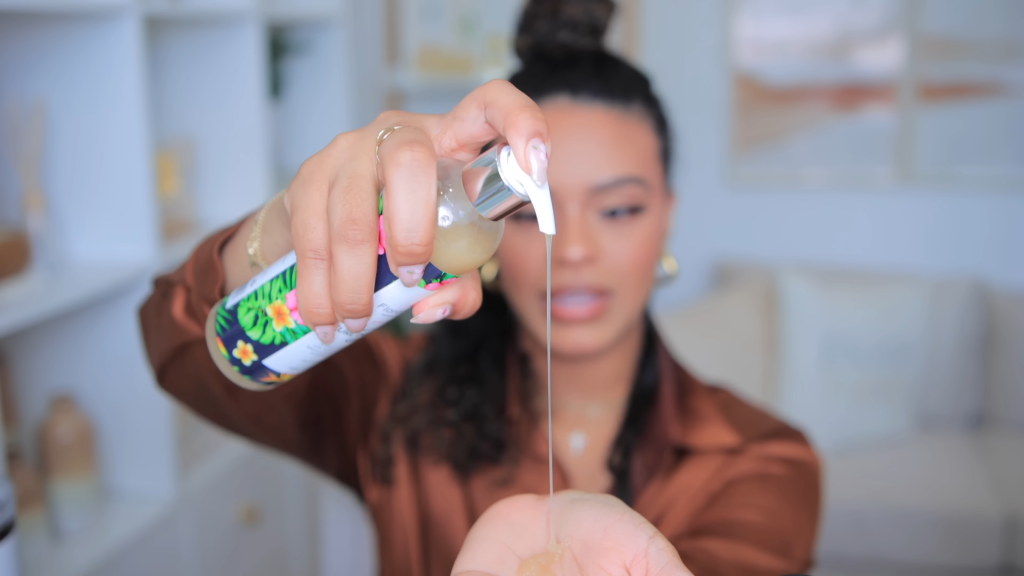Discover the top everyday shampoo options specifically designed for African hair.
The Best Everyday Shampoo for African Hair
African hair is unique in its texture and requires special care for optimum health and appearance. Choosing the right shampoo is essential for maintaining beautiful African hair on a daily basis. In this article, we will explore the characteristics of African hair, common challenges faced by individuals with African hair, the importance of choosing the right shampoo, top recommended everyday shampoos for African hair, proper ways to shampoo African hair, and essential hair care tips for maintaining healthy African hair beyond just using shampoo.

Understanding African Hair: An Overview
African hair is a unique and beautiful hair type that requires special care and attention. It tends to have a tightly coiled or kinky texture, setting it apart from other hair types. The texture of African hair is a result of the distinctive shape of the hair follicles, which are flat and oval instead of round. This unique structure gives African hair its characteristic coiled nature.
One of the notable characteristics of African hair is its tendency to be dry. The coiled structure of the hair makes it difficult for natural oils produced by the scalp to travel down the hair shaft. As a result, African hair often lacks the moisture it needs, leading to dry and brittle strands. This dryness can be a significant challenge for individuals with African hair, as it can make the hair more prone to breakage and damage.
In addition to dryness, African hair also has a lower water content compared to other hair types. This lower water content contributes to the hair’s tendency to be dry and can further exacerbate the challenges faced by individuals with African hair. It is essential to understand and address these unique characteristics when caring for African hair.
The Unique Characteristics of African Hair
African hair’s coiled texture is not only visually stunning but also requires specific care to maintain its health and vitality. The tightly coiled nature of African hair can make it more prone to tangles and knots. These tangles can be challenging to manage and may require extra time and care during the detangling process.
Another characteristic of African hair is its tendency to shrink when exposed to moisture or humidity. This shrinkage can make the hair appear shorter than it actually is, leading to misconceptions about its length. Embracing and understanding this natural shrinkage is essential for individuals with African hair, as it allows for better styling and maintenance.
Common Challenges Faced by African Hair
One of the primary challenges faced by individuals with African hair is dryness. The coiled structure of the hair makes it difficult for natural oils produced by the scalp to travel down the hair shaft, resulting in dry and brittle strands. To combat this dryness, it is crucial to incorporate moisturizing products into the hair care routine. Deep conditioning treatments, leave-in conditioners, and oils rich in essential fatty acids can help replenish and retain moisture in African hair.
In addition to dryness, African hair is also more prone to tangles and knots due to its tightly coiled nature. These tangles can be frustrating and time-consuming to detangle, often leading to breakage if not handled with care. Using a wide-toothed comb or fingers to gently detangle the hair starting from the ends and working upwards can help minimize damage and breakage.
Furthermore, the unique characteristics of African hair, such as its coiled texture and shrinkage, can make it more challenging to find suitable styling techniques and products. It is important to choose hair care products specifically formulated for African hair, as they are designed to address its unique needs. Additionally, protective hairstyles such as braids, twists, and buns can help minimize manipulation and reduce the risk of breakage.
Overall, understanding the unique characteristics and challenges of African hair is essential for proper care and maintenance. With the right knowledge, products, and techniques, individuals with African hair can embrace and celebrate the beauty of their natural hair.
Importance of Choosing the Right Shampoo for African Hair
Role of Shampoo in Hair Health
Shampoo plays a vital role in maintaining the overall health of African hair. It helps to remove dirt, excess oil, and product buildup from the scalp and hair follicles. By cleansing the scalp and hair, shampoo promotes a clean and healthy environment for hair growth. However, choosing the right shampoo is crucial to ensure that it caters specifically to the unique needs of African hair.
African hair is known for its unique texture and structure. It tends to be more fragile and prone to dryness and breakage compared to other hair types. Therefore, using the right shampoo is essential to prevent further damage and maintain the hair’s natural beauty.
One of the key benefits of using the right shampoo for African hair is its ability to provide essential moisture. Dryness is a common issue for individuals with African hair, and it can lead to brittleness and breakage. A good shampoo for African hair should contain moisturizing ingredients that help restore and retain moisture, such as shea butter, coconut oil, or argan oil. These ingredients penetrate the hair shaft, providing deep hydration and nourishment.
Furthermore, a gentle shampoo is crucial for African hair. The scalp is delicate, and using harsh shampoos can cause irritation and inflammation. It is important to choose a shampoo that is free from sulfates, as sulfates can strip away the hair’s natural oils, leaving it dry and prone to damage. Opting for a sulfate-free shampoo ensures that the hair retains its natural oils, providing a protective barrier against environmental stressors.
Factors to Consider When Choosing a Shampoo
When selecting a shampoo for African hair, there are several factors to consider. Firstly, it is important to look for shampoos that are sulfate-free. Sulfates, such as sodium lauryl sulfate (SLS) and sodium laureth sulfate (SLES), are common ingredients in many shampoos but can be harsh on African hair. These sulfates can strip away the natural oils from the hair, leading to dryness and increased breakage. By choosing a sulfate-free shampoo, you can ensure that your hair retains its moisture and remains healthy.
In addition to being sulfate-free, a good shampoo for African hair should contain moisturizing ingredients. Shea butter, coconut oil, and argan oil are excellent choices as they provide intense hydration, nourishment, and protection to the hair. These ingredients help to combat dryness and prevent breakage, leaving the hair soft, manageable, and healthy.
Another crucial factor to consider is the pH balance of the shampoo. African hair tends to have a slightly acidic pH, ranging from 4.5 to 5.5. Using a shampoo that is pH balanced helps to maintain the hair’s natural acidity, preventing it from becoming too alkaline or acidic. An imbalanced pH can disrupt the hair’s cuticle, leading to frizz, dullness, and increased vulnerability to damage. Therefore, choosing a shampoo that is specifically formulated to maintain the natural pH of African hair is essential for its overall health and appearance.
Furthermore, it is beneficial to choose a shampoo that is specifically designed for African hair. These shampoos are often formulated with ingredients that cater to the unique needs of African hair, such as its texture, moisture retention, and overall health. They are designed to provide the necessary nourishment and protection, ensuring that your hair remains strong, vibrant, and beautiful.
In conclusion, choosing the right shampoo for African hair is crucial for maintaining its overall health and appearance. By selecting a sulfate-free shampoo that contains moisturizing ingredients and is pH balanced, you can ensure that your hair remains moisturized, protected, and resilient. Taking the time to find the perfect shampoo for your African hair will lead to healthier, more manageable, and beautiful locks.
Top Recommended Everyday Shampoos for African Hair
Product Reviews and Comparisons
Here are some top recommended everyday shampoos for African hair:
- Brand A Everyday Shampoo: This shampoo is specifically formulated for African hair and contains nourishing ingredients like jojoba oil and aloe vera.
- Brand B Moisturizing Shampoo: This shampoo is known for its hydrating properties and is suitable for dry and damaged African hair.
- Brand C Gentle Cleansing Shampoo: This shampoo is designed to cleanse without stripping away natural oils, making it ideal for African hair.
Pros and Cons of Each Shampoo
Brand A Everyday Shampoo: Pros – provides intense moisture, strengthens hair, Cons – may be expensive for some budgets, not easily accessible in all locations.
Brand B Moisturizing Shampoo: Pros – deeply hydrates, repairs damaged hair, Cons – may weigh down fine hair, strong fragrance.
Brand C Gentle Cleansing Shampoo: Pros – gentle on the scalp, suitable for daily use, Cons – may not provide enough moisture for extremely dry hair, limited availability.
How to Properly Shampoo African Hair
Step-by-Step Guide to Washing African Hair
Properly shampooing African hair is essential to maintain its health. Here is a step-by-step guide:
- Wet the hair thoroughly with warm water.
- Apply a quarter-sized amount of shampoo to the palms of your hands and lather it between your hands.
- Gently massage the shampoo into the scalp, focusing on the roots.
- Rinse the shampoo out thoroughly with warm water, ensuring all traces of shampoo are removed.
- Follow with a moisturizing conditioner.
Tips to Avoid Damage While Shampooing
To avoid damaging African hair while shampooing, follow these tips:
- Use your fingertips to gently massage the scalp without applying too much pressure.
- Avoid using hot water, as it can strip away essential oils from the hair.
- Avoid vigorously towel-drying the hair; instead, blot it gently with a microfiber towel or an old t-shirt.
Maintaining Healthy African Hair

Essential Hair Care Tips
In addition to using the right shampoo, here are some essential hair care tips for maintaining healthy African hair:
- Moisturize regularly: African hair needs regular moisture to prevent dryness and breakage. Use leave-in conditioners or moisturizing oils to keep the hair hydrated.
- Protective styling: Opt for protective hairstyles like braids, twists, or buns to minimize manipulation and protect the ends of the hair.
- Use wide-toothed combs or your fingers for detangling: Detangle the hair gently, starting from the ends and working your way up to minimize breakage.
Recommended Hair Care Products Beyond Shampoo
In addition to shampoo, there are various hair care products that can enhance the health of African hair:
- Deep conditioning treatments: These treatments provide intense moisture to the hair and can be done on a weekly or monthly basis, depending on the hair’s needs.
- Scalp oils or serums: Applying scalp oils or serums can nourish the scalp and promote healthy hair growth.
- Satin or silk pillowcases and headscarves: Sleeping on satin or silk can help prevent friction and reduce breakage while maintaining moisture.
In conclusion, finding the best everyday shampoo for African hair is crucial for maintaining its health and appearance. By understanding the unique characteristics and challenges of African hair, considering the role of shampoo in hair health, and following proper shampooing techniques, individuals can keep their African hair looking its best. Additionally, incorporating essential hair care tips and using recommended hair care products beyond shampoo can further enhance the health and beauty of African hair.





